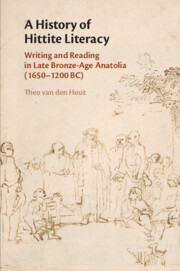Book contents
- A History of Hittite Literacy
- A History of Hittite Literacy
- Copyright page
- Dedication
- Contents
- Figures
- Tables
- Preface and Acknowledgments
- Map
- Timeline and Hittite Kings
- Sigla and Abbreviations
- Chapter 1 Introduction
- Chapter 2 Writing and Literacy among the Anatolians in the Old Assyrian Period
- Chapter 3 From Kanesh to Hattusa
- Chapter 4 First Writing in Hattusa
- Chapter 5 Literacy and Literature in the Old Kingdom until 1500 BC
- Chapter 6 The Emergence of Writing in Hittite
- Chapter 7 A Second Script
- Chapter 8 The New Kingdom Cuneiform Corpus
- Chapter 9 The New Kingdom Hieroglyphic Corpus
- Chapter 10 The Wooden Writing Boards
- Chapter 11 The Seal Impressions of the Westbau and Building D, and the Wooden Tablets
- Chapter 12 In the Hittite Chancellery and Tablet Collections
- Chapter 13 Scribes and Scholars
- Chapter 14 Excursus
- Chapter 15 The End and Looking Back
- Bibliography
- Index Locorum
- General Index
Chapter 11 - The Seal Impressions of the Westbau and Building D, and the Wooden Tablets
Published online by Cambridge University Press: 18 December 2020
- A History of Hittite Literacy
- A History of Hittite Literacy
- Copyright page
- Dedication
- Contents
- Figures
- Tables
- Preface and Acknowledgments
- Map
- Timeline and Hittite Kings
- Sigla and Abbreviations
- Chapter 1 Introduction
- Chapter 2 Writing and Literacy among the Anatolians in the Old Assyrian Period
- Chapter 3 From Kanesh to Hattusa
- Chapter 4 First Writing in Hattusa
- Chapter 5 Literacy and Literature in the Old Kingdom until 1500 BC
- Chapter 6 The Emergence of Writing in Hittite
- Chapter 7 A Second Script
- Chapter 8 The New Kingdom Cuneiform Corpus
- Chapter 9 The New Kingdom Hieroglyphic Corpus
- Chapter 10 The Wooden Writing Boards
- Chapter 11 The Seal Impressions of the Westbau and Building D, and the Wooden Tablets
- Chapter 12 In the Hittite Chancellery and Tablet Collections
- Chapter 13 Scribes and Scholars
- Chapter 14 Excursus
- Chapter 15 The End and Looking Back
- Bibliography
- Index Locorum
- General Index
Summary
The thousands of bullae and other objects impressed with seals found in the Hittite capital Hattusa have thus far been interpreted, almost exclusively, as related to wooden tablets. The seal impressions contain the names and very often also the titles of kings and high-ranking officials allegedly witnessing royal decisions recorded on the wooden tablets that were lost in fires that destroyed the buildings where they were kept. Such buildings would have housed the state archives of the Hittite kingdom. This theory leaves a lot of essential questions unanswered. Instead, using Neo-Assyrian and later parallels, it is proposed that these collections of sealings were used as reference collections to check the authenticity of a seal and to detect forgeries. Seal forgeries were common in the ancient Near East and checking earlier impressions from the same persons was the only way to verify the authenticity of incoming sealed documents and goods.
Keywords
- Type
- Chapter
- Information
- A History of Hittite LiteracyWriting and Reading in Late Bronze-Age Anatolia (1650–1200 BC), pp. 218 - 233Publisher: Cambridge University PressPrint publication year: 2021

